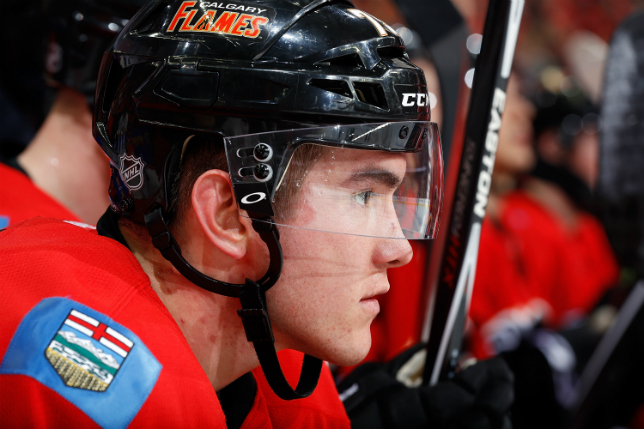
Calgary Flames GM Jim Treliving says the Flames and Micheal Ferland are apart on ‘money and term’ when it comes to a contract for the restricted free agent. If the Flames go all in, they have to hope Ferland becomes Lucic-Lite. But if he takes a short-term ‘show me’ deal, Ferland can cash in big if he can maintain the type of play that made him a fan-favorite in the post-season.
 Calgary, Ferland apart on ‘money and term’ — what’s his value to Flames?
Calgary, Ferland apart on ‘money and term’ — what’s his value to Flames?Unless the two sides can hammer out a contract before the season begins, Calgary fan-favorite Micheal Ferland might not be in the Flames lineup on opening night.
Ferland captured the hearts of Flames fans in the post-season with his physical play, but the 23-year-old left winger is still a restricted free agent and, according to Calgary Flames GM Jim Treliving, it doesn’t appear Ferland is any closer to inking a new contract.
The Calgary Sun’s Randy Sportak spoke with Calgary Flames GM Brad Treliving, who quipped that the only things keeping the deal from getting finished are, “money and term, that’s all.”
“We’ll bang away,” Treliving told Sportak. “We haven’t been able to find something that both sides nod on yet, but we’ve still got some time.”
Tongue in cheek remark aside, Treliving is right. There’s still some time for Ferland and the Flames to come to terms on a new contract. The difficulty, however, is finding the middle-ground for a player who has only 35 career regular season and playoff games under his belt but has shown the ability to have some scoring punch and a knack for driving the opposition crazy.
Ferland is coming off of his three-year, entry-level deal, but he spent most of the past two seasons in the AHL and only suited up for 64 games — less than a full campaign spread over two years. That he has managed to score 13 goals and 33 points in the AHL is promising, though. But if there’s anything that’s holding up the deal, it’s Ferland’s post-season play.
Over nine playoff games, he was an absolute wrecking ball, especially in the Flames’ first round series against the Vancouver Canucks. Ferland managed two goals and four points against the Canucks, but was also credited with 40 hits while averaging roughly 13:30 of ice time per game in the series. His physicality made him a focal point for Vancouver and more often than not Ferland was in the middle of scrums and drawing the ire of the Canucks. That he scored two goals in the series-clinching sixth game was the cherry on top of Ferland’s coming out party.
While it’s hard to quantify Ferland’s contribution, his style of play and his flashes of offensive ability make him something of a Milan Lucic-Lite. But with so little known about what Ferland’s full-time ability in the NHL will be like, it makes it hard to project what a fair salary should be.
In Lucic’s rookie campaign with the Bruins, he scored eight goals and 27 points while averaging little more than 12 minutes per game — that’s .35 points per game. Including the playoffs, Ferland scored .29 in his rookie season. And while major junior production doesn’t necessarily project scoring ability in the NHL, Ferland and Lucic were both point-per-game players during their 18-year-old seasons.
Of course, the difference between Ferland and Lucic is that by the time Lucic’s three-year entry level deal was up, he had played 199 NHL games and totalled 34 goals and 89 points. Ferland has scored much, much less and played far fewer games, so obviously the expectation isn’t that he’ll be getting the $12.25-million, three-year deal Lucic landed as a second contract. But what could be realistic?
It’s difficult to find comparable players for Ferland, as he has played a scant 35 NHL games between regular season and the playoffs, but one player who has had similar numbers offensively is former Bruins left winger Daniel Paille. Since 2012-13, when playing 5-on-5, Paille has scored .57 goals, .66 assists and 1.22 points per 60 minutes. By comparison, in his short career, Ferland has scored .63 goals, .63 assists and 1.26 points per 60 minutes. Paille’s average contract value over the past seven seasons has been roughly $1.2 million.
Others with similar comparable offensive totals include Nikolai Kulemin, Tyler Ennis and Jay Beagle. Of those three, only Beagle represents anything near a close comparison to Ferland. Both Ennis and Kulemin have proven their offensive ability. Ferland has yet to do that.
For Ferland, biting the bullet and taking a short-term deal with a low average salary might be the way to go and it could be his only real option. Holding out won’t do him much good, especially if he can start the season off by carrying over his momentum from the Flames’ post-season run. But he has to establish himself before he can command top dollar.
Ferland’s next deal will be an important one and it will be tough for both parties to walk the fine line between underpayment and overpayment. Regardless of what his new contract pays him, though, if Ferland can replicate his playoff performance over the course of an entire year, he could cash in huge when it comes time to re-up again.

